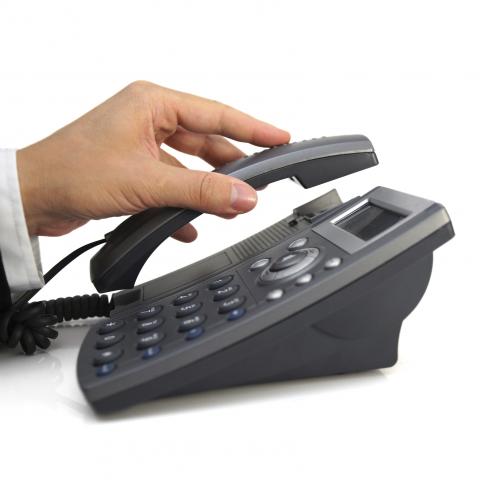
Many Spanish learners have a hard time expressing themselves or understanding others over the phone. Connection problems aside, you can encounter situations where you struggle to keep up because the person on the other end is speaking too quickly. This can make you anxious, or even afraid, to speak during a phone call.
Non-verbal communication and body language are important components of conversation. Whenever we speak to someone on the phone, we miss out on these subtle clues since we cannot see their face or posture.
But there’s good news. Learning Spanish phone conversation phrases will help you become more confident and prepared for calls!
In this guide from SpanishPod101, you’ll learn the most common Spanish phone phrases. Having these phrases down will help you crush your conversations, whether you’re arranging a brunch date with a friend or making a business call.
Remember: Practice makes perfect!

Ready for great Spanish phone conversations? Start with Hola!
 Table of Contents
Table of Contents
- Picking up the Phone
- Saying Who You Are
- Stating Why You’re Calling
- Asking to Speak to Someone
- Asking Someone to Wait
- Leaving a Message
- Asking for Clarification
- Ending the Phone Call
- Bonus: Sample Phone Conversations
- Final Thoughts
1. Picking up the Phone
The first set of Spanish phone phrases you need to learn are the greetings. The greeting you use may differ depending on whether you’re the caller or the receiver.
1 – Calling
| Hola. | Hello. |
| The well-known hola is an informal Spanish greeting used in real life and over the phone. If you know the name of the person you’re calling, you can use it in the greeting: Hola, ___. | |
| Buenos días. / Buenas tardes. | Good morning. / Good afternoon. |
| Buenos días and buenas tardes sound a bit more formal, so these are safe to use during business calls. | |
2 – Answering
| ¿Sí? | Yes? |
| This is how most Spanish people answer the phone, especially if it’s their personal number. | |
| ¿Diga? / ¿Dígame? | Hello? |
| Literally meaning “Tell me,” this is an apt way to begin a Spanish phone conversation. It’s most common in formal situations and among the older Spanish-speaking population. | |
| Hola. | Hello. |
| Nowadays, we often know who’s calling because their name appears on our phone screen if we’ve saved their number. If the caller is a saved contact, you can simply answer with hola. | |
| ¿Aló? | Hello? |
| This is a very common Spanish phone call greeting, but only in Latin America! | |
| Bueno. | Hello. |
| Bueno, literally meaning “good” or “well,” is a common phone greeting used in Mexican Spanish. | |
- → There are many other ways to say hello in Spanish, most of which can be used to begin a phone conversation. Learn about greeting people on SpanishPod101.com!

Pick up the phone; someone’s calling you!
2. Saying Who You Are
Now that you’ve learned some useful greetings, you should become familiar with a few Spanish phone phrases for introducing yourself.
In informal conversations, you’d say Soy (“I am”) followed by your name. Here’s an example:
- A: ¿Sí? – “Yes?”
B: ¡Hola Manuel! Soy Andrea. – “Hello, Manuel! This is Andrea.”
If you’re calling on behalf of a company or an organization, the structure of the sentence should be:
- Soy [name], de [company name]. – “This is [name], from [company name].”
However, making a business phone call in Spanish can get a tad more formal:
- Mi nombre es [name], de [company name]. – “My name is [name], from [company name].”

Buenos días, mi nombre es Juan. (“Good morning, my name is Juan.”)
- → Make sure to visit our lesson How to Introduce Yourself to learn about this topic in greater depth!
3. Stating Why You’re Calling
| Querría hablar con alguien sobre… | I’d like to speak to someone about… |
| You can use this phrase to ask for assistance with something, especially if you’re contacting an institution, company, or organization. Example:
| |
| Quería información sobre… | I wanted some information about… |
This phrase can be used to ask for directions, schedules, timetables, etc.
| |
| Me gustaría preguntar si… | I’d like to ask if… |
This is a polite introduction to whatever question you have. Here are a few examples:
| |
| Estoy devolviendo tu llamada. | I’m returning your call. |
| Llamaba para reservar una mesa. | I was calling to make a reservation. |
| Literally, this phrase means: “I was calling to book a table.” | |
- → Don’t miss our lesson Is Your Friend Answering the Phone? to learn how to properly use Spanish grammar in a phone conversation!

Lo siento, la línea está ocupada. (“I’m sorry, the line is busy.”)
4. Asking to Speak to Someone
If you’re meaning to call a specific person and someone else comes to the phone, here’s how you ask to be handed over to the right person.
In informal conversations, you’d say the following:
- ¿Está [name]? – “Is [name] there?”
A more polite way to ask the same question would be:
- ¿Me podrías poner con [name]? – “Could you transfer me to [name]?”
And here’s a formal alternative:
- Querría hablar con [name]. – “I’d like to speak to [name].”
Open for business? Learn all about Making a Business Phone Call with SpanishPod101!
5. Asking Someone to Wait
If the conversation is going too fast and you need a second to collect your thoughts, look up information, or fetch the person they’re calling, here are a few Spanish phone conversation phrases that can help.
| Un momento, déjame comprobar. | Just a moment, let me check. |
| Te / Le pongo en espera un momento. | I’ll put you on hold for a second. |
| In Spanish, your tone can come across quite differently depending on the formality level you use. In this case, the pronoun te sounds much more casual than the pronoun le. Remember to use the formal pronoun in business conversations, when doing bureaucratic processes, when asking for professional help, etc. | |
- → Don’t miss our blog post Ultimate Guide to Spanish Pronouns. Reading through it will help you better understand how to use formal Spanish.
| No cuelgues / cuelgue, por favor. | Don’t hang up, please. |
| Ahora te lo / la paso. | I’ll put him/her on the phone. |
| If the caller is asking for your roommate or a coworker, this is an informal way to state that you’ll ask them to answer the phone. | |
| Déjame transferirte / Déjeme transferirle a su oficina. | Let me transfer you to his/her office. |
| This is the formal and business-style way to say Ahora te lo paso. | |

Déjeme transferirle a su oficina. (“Let me transfer you to her office.”)
6. Leaving a Message
Did you miss the person you were calling? Here are three Spanish phone call phrases you can use to leave a message:
| ¿Puedo dejarle un mensaje? | Can I leave a message? |
| Por favor, dígale de mi parte que… | Please let him know that… |
| ¿Le puede decir que me llame al [phone number]? | Can you tell him to call me back at [phone number]? |
| Of course, sometimes you might prefer to deliver the message yourself. This phrase is how you ask for the person to call you back. | |
7. Asking for Clarification
When learning a new language, phone conversations with native speakers are some of the trickiest situations we have to face.
If you don’t understand what the person on the other end is saying, don’t worry. Take a deep breath and then use one of these phone call phrases in Spanish to ask for clarification.
| Perdón, ¿podrías repetirlo? | Sorry, could you say that again? |
| ¿Podrías repetirlo, solo para comprobar que te he entendido? | Could you repeat that, just to double-check I understood? |
| There’s no harm in double-checking! Don’t hesitate to ask as many times as you need to make sure you understand the other person. | |
| No te he entendido, disculpa. | I didn’t understand, I’m sorry. |
| Lo siento, pero me está costando entenderte. | I’m sorry, but I’m having a hard time understanding you. |
| Creo que hay una mala conexión. | I think there’s a bad connection. |
| Sometimes, technology can add even more obstacles when we’re trying to understand a conversation in a foreign language. | |
| ¿Podrías deletrear tu nombre, por favor? | Could you spell your name for me, please? |

Lo siento, pero me está costando entenderte. (“I’m sorry, but I’m having a hard time understanding you.”)
8. Ending the Phone Call
There are many ways to end a call, depending on the kind of call you’ve had. Whether you were asking for some information, arranging a meeting, or just chatting, here are a few phone call phrases in Spanish you can use.
| Me has ayudado mucho. Gracias. | You’ve been very helpful. Thank you. |
| Gracias por su ayuda. | Thanks for your help. |
| This is a formal way to end a phone call when you want to show gratitude. You can also use the informal variation: Gracias por tu ayuda. This is more heartfelt and honest, good for when you’re speaking to a friend. | |
- → Feeling extra grateful? Check out SpanishPod101’s blog entry How to Say “Thank you” in Spanish.
| Un placer hablar contigo / con usted. | It was a pleasure talking with you. |
| Nos vemos a las [time] en [place]. | See you at [time] at [place]. |
| It doesn’t hurt to repeat the time and place you’ve set for a meeting, just to double-check that you understood. | |
| Que tengas un buen día. | Have a great day. |
| Adiós. | Bye. |
| You might find that some Spanish people have a hard time letting go of the conversation and actually hanging up the phone. It’s because they’re very friendly! Don’t be surprised if they use all of the phrases above to say goodbye. Here’s an example:
| |
9. Bonus: Sample Phone Conversations
You now have plenty of phrases to start practicing! But how might they sound when used in a real-life phone call?
Here, we’ve included two sample phone conversations in Spanish. The first one is an informal call, while the second one takes place in a more formal context.
Enjoy!
1 – Asking your friend to meet for brunch
A: ¿Sí? – “Yes?”
B: Ey Juan, soy Marta. ¿Qué tal? – “Hey Juan, it’s Marta. How’s it going?”
A: ¡Hola Marta, cuánto tiempo! Todo bien, ¿qué tal tú? – “Hello Marta, it’s been so long! All good, how about you?”
B: Pues muy bien, justo quería proponerte de vernos este fin de semana. – “I’m good, I wanted to propose that we meet up this weekend.”
A: ¡Suena genial! Pero estoy ocupado todo el sábado… – “Sounds great! But I’m busy all Saturday…”
B: ¿Y qué tal el domingo? Podríamos quedar para tomar un brunch. – “How about Sunday? We could meet up for brunch.”
A: Perfecto. ¿Quedamos a las 12 donde siempre? – “Perfect. Should we meet at 12 in the usual spot?”
B: Vale. ¡Nos vemos entonces! – “Okay. See you then!”
A: Sí, ¡qué ganas! Hasta el domingo. – “Yes, can’t wait! See you on Sunday.”
B: Que vaya bien, ¡besos! – “Take care, kisses!”
A: ¡Un beso, Marta! Adiós. – “Kisses, Marta! Bye.”
2 – Making a reservation
A: Restaurante Antojo, ¿dígame? – “Antojo Restaurant, hello?”
B: Buenos días, llamaba para ver si tenían una mesa libre esta noche. – “Good morning, I was calling to know if you have a free table this evening.”
A: ¿Para cuántas personas sería? – “How many people in your party?”
B: Somos cinco, aunque uno podría fallar a última hora. – “We’re five, but one of us could not make it last minute.”
A: No hay problema. Tenemos mesa para ustedes. – “No problem. We have a table for you.”
B: ¡Perfecto! Otra pregunta, ¿tienen opciones veganas? – “Perfect! Another question, do you have any vegan options?”
A: Sí, todo nuestro menú es adaptable para veganos y personas con alergias alimentarias. – “Yes, our whole menu can be adapted to vegans and people with food allergies.”
B: Estupendo, ¿puede reservarnos la mesa para las 9? – “Great, could we make a reservation for nine p.m.?”
A: Tendría ser a las 9 y media ya que antes tenemos lleno, lo lamento. – “It has to be for 9:30 as we’re fully booked before that, I’m sorry.”
B: Ningún problema, también nos va bien. – “No problem, it’s also okay for us.”
A: Pues les esperamos esta noche a las 9 y media. – “So we’ll expect you at 9:30.”
B: ¡Muchas gracias! Hasta luego. – “Thank you so much! See you later.”
A: A usted, hasta luego. – “You’re welcome, see you later.”

¡Mesa para cinco! (“Table for five!”)
10. Final Thoughts
In this guide, you’ve learned the basic vocabulary and expressions you’ll need to make a phone call in Spanish. We hope the phrases we lined up here will help you have a successful conversation, from picking up the phone to ending the call.
Do you feel more confident about your next all-Spanish phone call now? Or are there still some phone phrases or situations you’d like to see covered? Let us know in the comments!
If you’d like to continue learning and improving your Spanish, create your free lifetime account on SpanishPod101.com today! We have tons of lessons tailored for every level, free vocabulary lists, and a blog with lots of fun and interesting posts like this one.
Happy learning!










